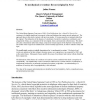Free Online Productivity Tools
i2Speak
i2Symbol
i2OCR
iTex2Img
iWeb2Print
iWeb2Shot
i2Type
iPdf2Split
iPdf2Merge
i2Bopomofo
i2Arabic
i2Style
i2Image
i2PDF
iLatex2Rtf
Sci2ools
JASIS
2010
2010
So mechanical or routine: The not original in Feist
The United States Supreme Court case of 1991, Feist Publications, Inc. v. Rural Tel. Service Co., continues to be highly significant for property in data and databases but remains poorly understood. The approach taken in this article contrasts with previous studies. It focuses upon the not original rather than the original. The delineation of the absence of a modicum of creativity in selection, coordination, and arrangement of data, as a component of the not original, forms a pivotal point in the decision. The article also aims at elucidation rather than critique, using close textual exegesis of the Supreme Court decision. The results of the exegesis are translated into a more formally logical form, in order to enhance clarity and rigor. The insufficiently creative is initially characterized as, ‘so mechanical or routine’. Mechanical and routine are understood in their ordinary discourse senses, as a conjunction or as connected by AND, and as the central clause. Subsequent clauses...
| Added | 28 Jan 2011 |
| Updated | 28 Jan 2011 |
| Type | Journal |
| Year | 2010 |
| Where | JASIS |
| Authors | Julian Warner |
Comments (0)

